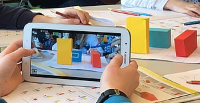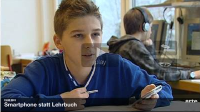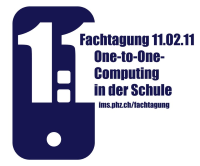Praktische Literatur zu 1:1- und BYOD-Projekten (englisch)
Dies ist eine sicher nicht vollständige Liste von empfehlenswerter englischsprachiger Literatur für PraktikerInnen, die ein 1:1-Projekt planen oder bereits umsetzen. Diese Liste enthält nur Publikationen, die sich explizit 1:1-Ausstattungen widmen, nicht aber allgemeinen Ratgebern zur Einführung digitaler Medien im Unterricht. Diana Bannister, Anja Balanskat, Katja Engelhardt (2013)
Diana Bannister, Anja Balanskat, Katja Engelhardt (2013)Developing Practical Guidelines for 1:1 Computing Initiatives
Biblionetz:b05403 This set of practical guidelines has been developed by a team of experts at European Schoolnet following their work with 1:1 computing initiatives; in particular the experience gained in the practical implementation of the Acer-European Schoolnet Educational Netbook Pilot and the Acer-EuropeanSchoolnet Educational Tablet pilot.
 Jonathan P. Costa (2012)
Jonathan P. Costa (2012)Digital Learning for All, Now
A school leader's guide for 1:1 on a budget
Biblionetz:b05508 Instead of carrying bulging backpacks, imagine students carrying mobile devices that allow them to access information from anywhere at any time. How do we transition from print to digital learning in the midst of economic challenges? This breakthrough guide shows educators how to affordably make the shift to one-to-one computing and transform schools into digital learning centres. A step-by-step roadmap of solutions is outlined for overcoming budget and systems barriers, and moving forward with a sense of urgency.
 Pamela Livingston (2006)
Pamela Livingston (2006)1-To-1-Learning
Laptop Programs That Work
Biblionetz:b04317 1-to-1 Learning has been written for administrators, teachers, parents, researchers, and anyone whose school or school district is considering a laptop program. It can also serve the needs of educators who work in schools or districts that already have a laptop program but want to see what other schools have done and are doing. This book provides teachers with dozens of real-world stories describing how laptops have been used to transform teaching and learning. Patents can discover how students use laptops to deepen their learning and expand their horizons. Administrators will find the sections on planning, professional development, and logistics particularly useful as they steward their own laptop programs. Anyone considering a laptop program will find a host of anecdotes, ideas, lessons learned, and challenges overcome, each of which will be helpful as decisions are made.
 Gwen Solomon (2005)
Gwen Solomon (2005)1:1 Computing
A guidebook to help you make the right desicions
Biblionetz:b04318 _Students live in an on-demand, technology-dependent world. They learn differently and approach schoolwork differently than students did even a few years ago. This impacts learning, and some school districts are addressing students’ need to get answers instantly, to communicate as they learn, and to create information and share it with others. With 1:1 computing and wireless Internet access, students are able to learn in an environment where technology brings subjects to life and where students can own their learning environment and are so engaged that learning is meaningful. Establishing this new environment for such learning takes careful planning and consideration. We hope that the information in this guidebook provides you with useful advice, best practices and practical strategies.
While the success of any plan depends on individual goals, environments, planning, and personnel, certain strategies and ways of thinking emerge as universal. We address these issues in this guidebook to help create and implement an effective 1:1 initiative. In simple terms, the issues are planning, leadership, funding, infrastructure, professional development, instruction, evaluation, and sustainability._ %CLERABOX%
 Bob Johnstone (2003)
Bob Johnstone (2003)Never Mind the Laptops
Kids, Computers, and the Transformation of Learning
Biblionetz:b01459 If every kid had a laptop computer, what would difference would it make to their learning? And to their prospects? Today, these are questions that all parents, teachers, school administrators, and politicians must ask themselves. Bob Johnstone provides a definitive answer to the conundrum of computers in the classroom. His conclusion: we owe it to our kids to educate them in the medium of their time. In this book he tells the extraordinary story of the world’s first laptop school. How daring educators at an independent girlsÂ’ school in Melbourne, Australia, empowered their students by making laptops mandatory. And how they solved all the obstacles to laptop learning, including teacher training. Their example spread to thousands of other schools worldwide. Especially in America, where it inspired the largest educational technology initiative in US history: the State of Maine issuing laptops to every seventh-grader in its public school system. This lively, intriguing, anecdote-rich account is based on hundreds of interviews. In it, you'll meet the visionary leaders, inspirational principals, heroic teachers, and their endlessly-surprising students who showed what computers in the classroom are really for.
Weitere Literaturlisten
- Biblionetz:202173 One-to-One-Computing
- Biblionetz:w00753 Ein-Notebook-pro-Studentin
- Biblionetz:w01551 Handheld / PDA in school
- Biblionetz:w02286 Bring Your Own Device (BYOD)
Kontakt
Pädagogische Hochschule Schwyz
Zaystrasse 42
CH-6410 Goldau
T +41 41 859 05 90
info@phsz.ch Dies ist ein Wiki des Fachkerns Medien und Informatik der Pädagogischen Hochschule Schwyz. Für Fragen wenden Sie sich bitte an wikiadmin@phsz.ch
Pädagogische Hochschule Schwyz
Zaystrasse 42
CH-6410 Goldau
T +41 41 859 05 90
info@phsz.ch Dies ist ein Wiki des Fachkerns Medien und Informatik der Pädagogischen Hochschule Schwyz. Für Fragen wenden Sie sich bitte an wikiadmin@phsz.ch
This page was cached on 26 Mar 2024 - 02:52.

 Medien
Medien Informatik
Informatik Anwendung
Anwendung 1:1-Ausstattungen
1:1-Ausstattungen



